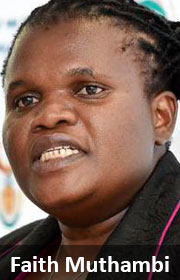 South Africa’s online environment has evolved significantly in recent years. The number of people with access to the Internet has grown tremendously, and the ways in which people access information and knowledge differ quite markedly compared to just a short few years ago.
South Africa’s online environment has evolved significantly in recent years. The number of people with access to the Internet has grown tremendously, and the ways in which people access information and knowledge differ quite markedly compared to just a short few years ago.
Additionally, the profile of the average Internet user has changed. The ubiquity of smartphones and the availability of cheaper tablets have meant that the average age of the online user is becoming younger.
These changing dynamics in the online landscape are to be welcomed as they have brought tangible economic benefits, improvements in people’s lives and eased access to vital knowledge and information.
As government and policy makers we are aware of the enormous opportunities that the Internet presents and, as such, we are committed to ensuring that as many people as possible experience its transformative capabilities.
In as much as we embrace the dynamism of the online environment, we remain acutely aware of the risks to security and privacy that come with the Internet. For policy to remain an effective instrument, it has to adapt to the changing reality.
This is the reason behind the proposed amendments to the online content regulation regime. The Film and Publication Board (FPB), which falls under the department of communications, has been hard at work to safeguard the online content environment and Internet users.
Contrary to speculation, the current draft of online content regulation policy does not create a new regulatory regime, but seeks to strengthen the law by closing the gaps identified in the Films and Publications Act in relation to online content regulation.
As the number of South Africans with access to the Internet continues to growth, policy makers have the responsibility to safeguard citizens against potential harmful online content.
The latest General Households Survey report by Statistics South Africa indicates that 40,9% of households have at least one member who either uses the Internet at home or has access to it elsewhere. As the world of online technology continues to evolve, it is critical for our online content regulations and policies to be up to date and responsive to challenges that arise from Internet usage.
There is unfounded speculation doing the rounds, the gist of which is that government wants to use amendments to online regulation to, among other things, muzzle the media. The imagination of some people clearly knows no bounds. It is worth pointing out that the Film and Publication Board is not in the business of censoring the media, nor does censoring the media fall under its mandate and framework of the law.

Furthermore, the interpretation that suggests that the online regulation policy will require all individuals to register with the board to upload digital content to the Internet is far from the truth. Sections 16 and 18 of the Films and Publications Act explicitly outline who will be required to register with the board and have content classified.
Illegal content is defined in the act as bestiality, propaganda for war, advocacy of hate speech based on race, religion and ethnicity, child pornography and exposure of minors to explicit sexual content. The mandate of the board and what constitutes illegal content is clearly defined in the act and in section 16(2) of the constitution.
In the same way that members of the public are not allowed to distribute hate speech or propaganda for war in physical platforms, the same prohibitions apply to the distribution of illegal content using social networking sites and other new media platforms.
Outside the scope of what is classified as prohibited content, the Film and Publication Board has no interest in what the public posts on social networking sites. In fact, the board encourages society to use new media and social networking sites as we believe that they play an important role in the dissemination of vital knowledge and educating people.
The co-regulation model that is being proposed seeks to lessen the financial burden of classification by ensuring that online distributors of digital film, games and certain publications are able to self-classify content using the board’s classification guidelines. There is no duty whatsoever on any other person except for these online distributors to register with the board.
- Faith Muthambi is minister of communications

